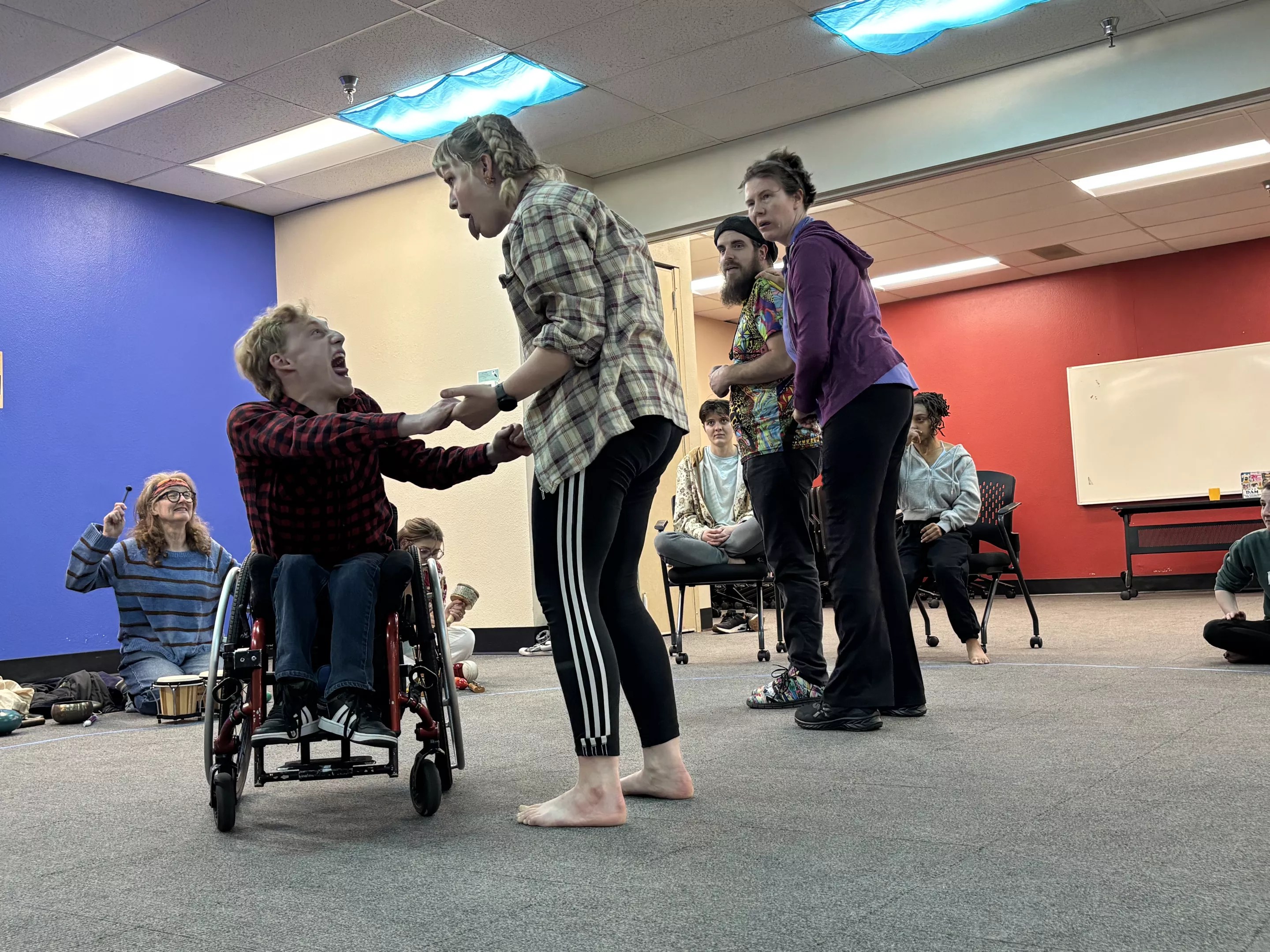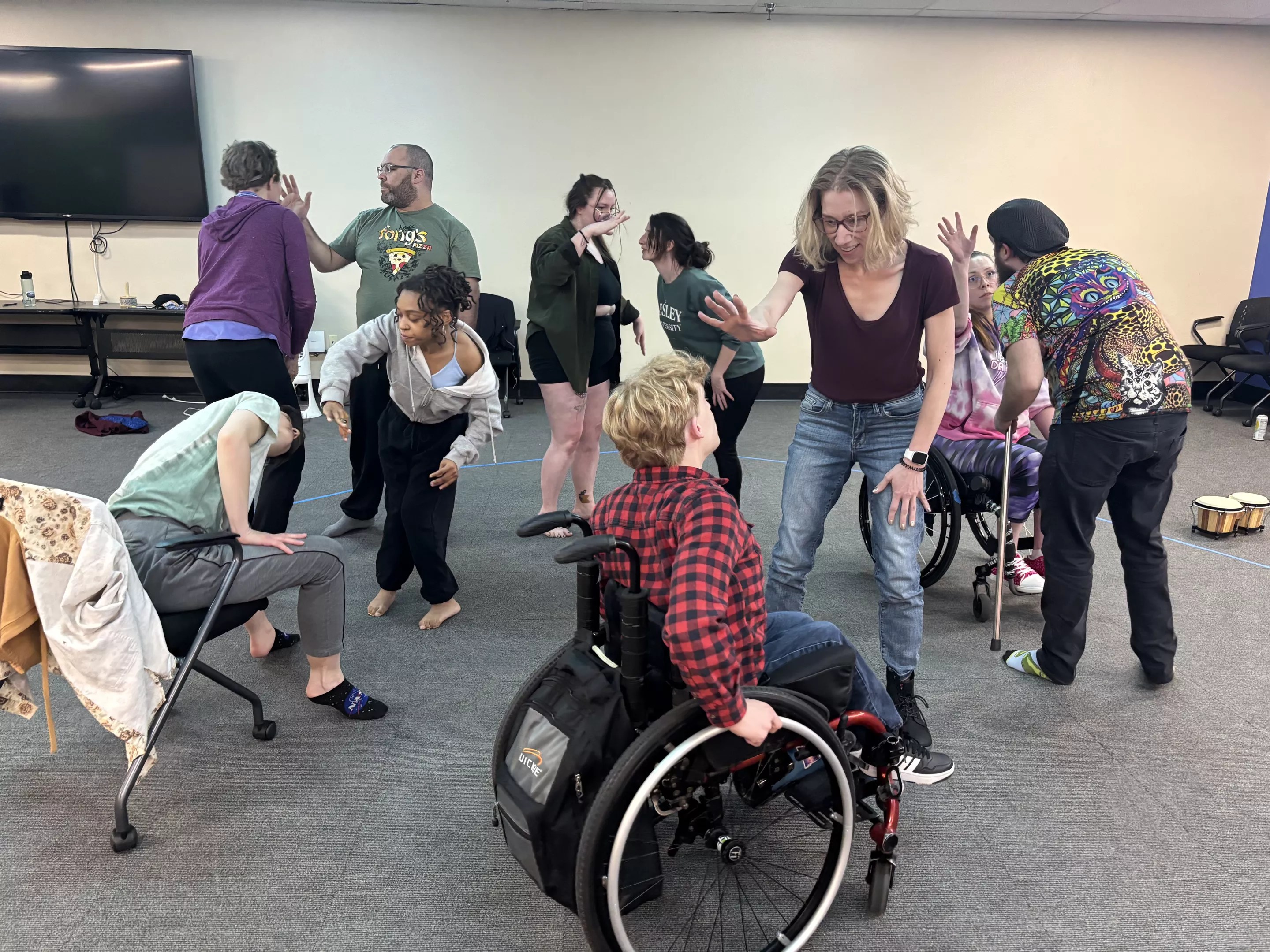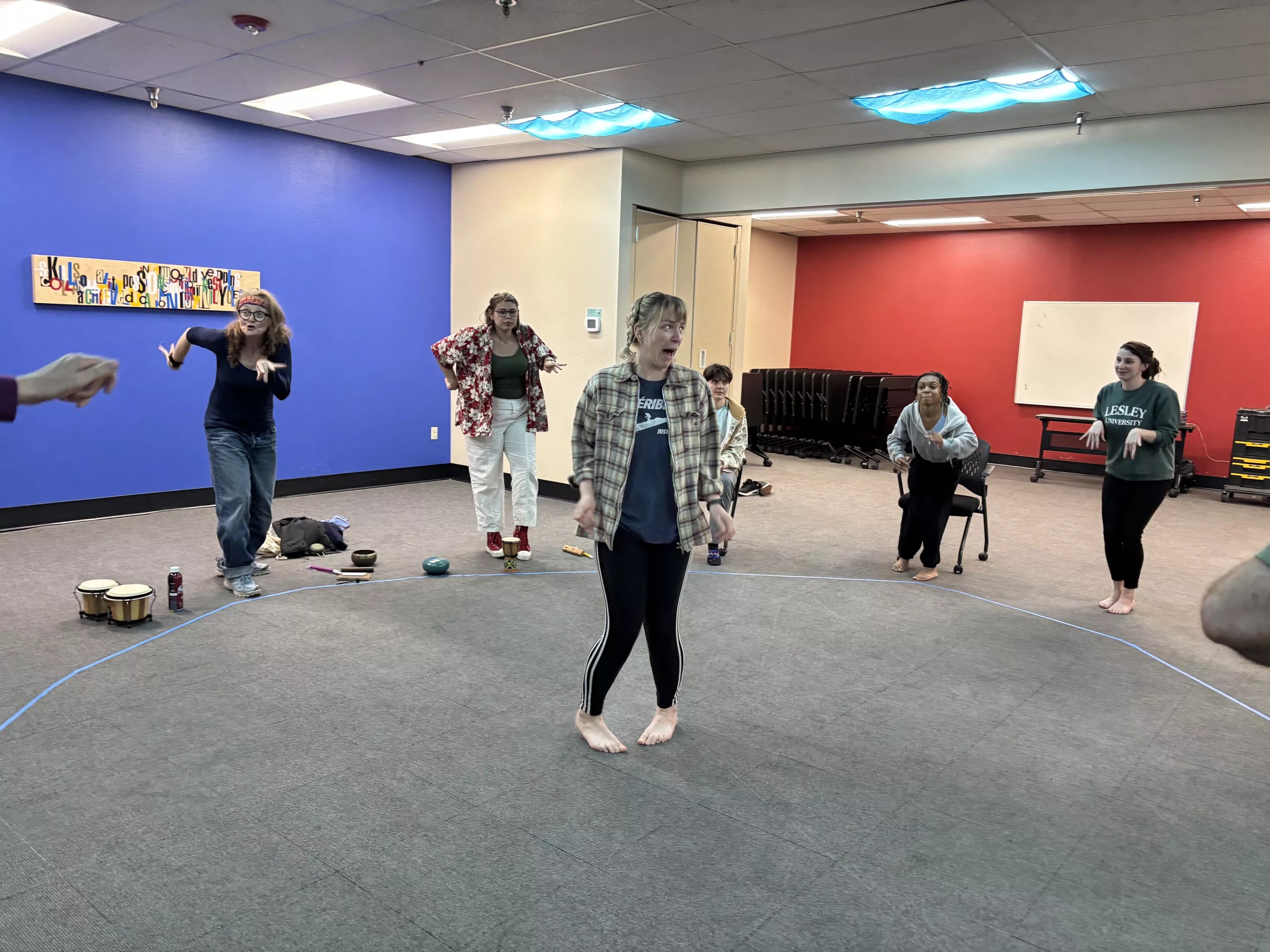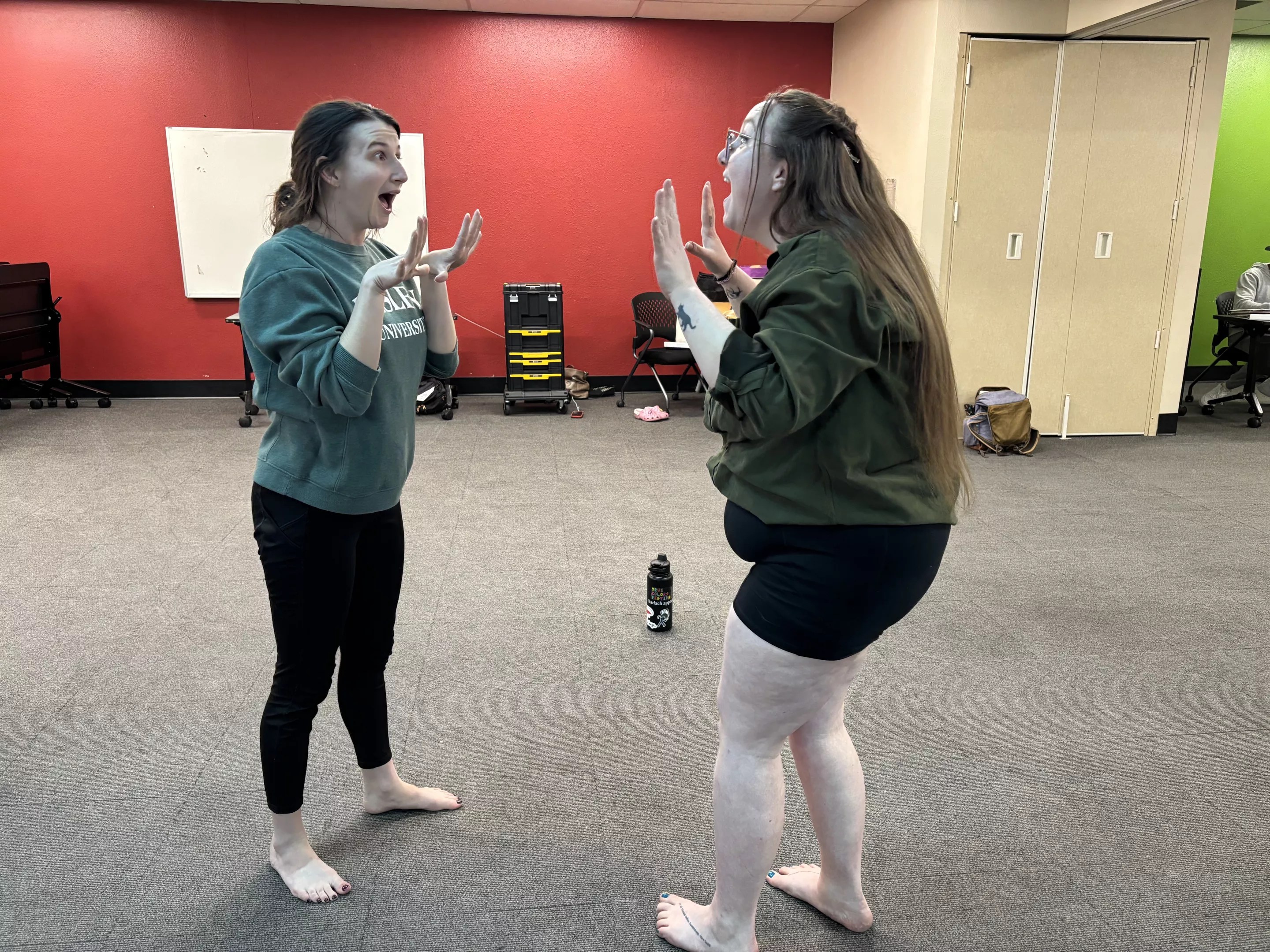
Courtesy of Phamaly Theatre Company

Audio By Carbonatix
In an industry that so often claims to be for everyone, theater spaces can still feel inaccessible – especially for people with high-support cognitive disabilities. Quiet rooms might be offered, wheelchair access considered and sensory kits handed out, but the structure of most performances still draws a clear line between actor and audience, invitation and exclusion.
That’s what makes Pericles: An Adaptive Performance for People with Cognitive Disabilities so revolutionary.
“There is so much language around theater companies being ‘safe spaces’ at the moment but this work actually is a safe place,” says Pericles assistant director Natasha Haward. “It’s a space where it doesn’t matter who you are or what you’ve been through. It’s just an open heart and arms to individuals once they enter.”
This month, the Denver-based Phamaly Theatre Company collaborated with London’s Flute Theatre to bring Shakespeare’s Pericles to life in a fully interactive, sensory-based production designed for people with intellectual and developmental disabilities. Touring Boulder, Colorado Springs and Aurora, the show offers a rare theatrical experience where disabled audience members aren’t just included – they’re at the center.

Pericles: An Adaptive Performance for People with Cognitive Disabilities was developed in collaboration with Denver’s Phamaly Theatre Company and London’s Flute Theatre.
Courtesy of Phamaly Theatre Company
“Here’s the thing: the play is not for the observers,” says Kelly Hunter, the founder of Flute Theatre and the creator of the Hunter Heartbeat Method that anchors the production. “It’s for the participants. An autistic participant will be offered the opportunity to experience what it’s like to be inside the play through short, repeatable games that will be adapted to their needs. No individual experience will be the same because every single autistic person and human being is different.”
The method, developed by Hunter during her time at the Royal Shakespeare Company, uses the rhythm of Shakespeare’s iambic pentameter, the heartbeat, as a foundation for interactive games. These games target core social and emotional skills like eye contact, emotional recognition and turn-taking, making them especially powerful tools for engaging individuals across the cognitive disability spectrum, including non-verbal participants.
Ben Raanan, Phamaly’s artistic director, first saw the method in action over a decade ago at a workshop Hunter led at Ohio State. Raanan entered knowing nothing about the Hunter Heartbeat Method and left determined to share what he had witnessed with others.
“After about ten minutes of it, even though I was in a bad mood coming into the workshop, I went, ‘Oh great, this is what I’m going to do for the rest of my life,'” Raanan recalls. “I came up to you and said something to that effect at the time. That was a ballsy thing to do in that moment, I’ll admit, but observing it from the outside, especially as someone who knew I wanted to work with disabled people in a way that wasn’t patronizing, was transformational.”
One of the reasons Raanan was so affected by the workshop was because it made him think of his brother, Adam, who has autism.
“My brother would frequently be told when going to events like bowling for people with autism or baseball for people with autism that he was ‘way too autistic to do this.’ He’s not the kind of autistic person that advocates talk about, but I thought maybe he could do this,” he says. “There were people with autism who were self-advocates, and then there were people who needed all the support in the world, but the activities didn’t change and everyone was having a great time.”

The company of Pericles: An Adaptive Performance for People with Cognitive Disabilities practices for its touring production.
Courtesy of Phamaly Theatre Company
Though Flute Theatre has toured Pericles since 2019 – adapting it for autistic audiences across Europe and refugee communities in London – this version marks a major first: it’s the only time the play has been performed exclusively by a company of disabled actors. For Hunter, that shift unlocks something profound.
“I didn’t approach working with the Phamaly actors any differently than other actors,” Hunter says. “I’m a director and whoever I’m working with will have to be the best artist they possibly can be and that’s that. But being here with this group of actors allows this group of disabled actors to empower other people. Not to be the object of obsession and judged – there is no judgment in this. It actually allows those people to use their hearts and souls and bodies to benefit others.”
While Raanan was immediately taken with the work, bringing it to Phamaly would take years and some serious conviction. When he pitched the idea to his team, it was clear the timing wasn’t ideal. The company would be knee-deep in preparations for its summer musical, Pippin at the Denver Center, as well as juggling its annual fundraiser.
“When I brought it to my team and board, I told them this was something different and so I didn’t feel comfortable taking a show away from our season to do this,” Raanan says. “Normally, our shows have around twenty people in them. I want our Phamaly actors to have opportunities, so I wanted to do an extra show. I told them, ‘We don’t have the money, time or energy, but I really want to do this.'”
The staff response was unanimous: Yes. Then came the board. “They’re supposed to be the ones to keep me in check,” he says, laughing. “But they got it, too. I showed some videos of the work and talked about what it meant to me, and they said, ‘We’ll find a way to make it happen.'”
The result is a three-city tour across Colorado with accessible venues, sensory support materials and ticket options for both participants and audience members. But Phamaly’s ambitions go far beyond this month’s performances.
“My hope is, when we say goodbye to Kelly, the Hunter Heartbeat program is something established here at Phamaly,” Raanan says. “I don’t think this show has a closing date. My goal is to learn as much from these two brilliant artists so that a) we are able to continue this work here and b) do it correctly. We’re going to keep doing Pericles. This is a trial run. This is introducing the work and hoping it becomes so big that people go, ‘We must have the other plays that Flute offers.'”
Some of the other shows the company has already adapted in this style include The Tempest and A Midsummer Night’s Dream. However, the company is already dreaming about what comes next. Hunter is currently developing an adaptive version of King Lear, a play she believes is uniquely suited to the format.

Two performers work on a scene from Pericles: An Adaptive Performance for People with Cognitive Disabilities.
Courtesy of Phamaly Theatre Company
“Everything Lear contains – the storm, the rage, the heartbreak – makes it perfect for this kind of work,” she says. “That’s my next project, so it would be wonderful to bring it to Denver. Maybe we’d create it here or hopefully it will be created already by the time we come back.”
For now, though, Pericles remains the beating heart of the collaboration, an ever-shifting piece of theater that centers love, play and connection. And at its core is a vision of artistic empowerment that runs deeper than applause.
“There are levels of empowerment that are totally different with this particular production,” Hunter says. “Rather than people, at worst, rather patronizingly come and see how a disabled actor does theater and then give them a kind of pat on the head because they managed something, this is actually an opportunity for that person to help another person. We’re always in a place of empowerment. Here, we’re allowing people who never have that opportunity to help others, forget about themselves and concentrate entirely on their partner.”
Pericles: An Adaptive Performance for People with Cognitive Disabilities, Wednesday, May 7, through Saturday, May 10, at the CU Boulder Loft Theatre, University Theatre Building, 1515 Central Campus Mall, Boulder; Thursday, May 15, through Sunday, May 18, at the Ent Center for the Arts, 5225 North Nevada Avenue, Colorado Springs; and Thursday, May 22, through Saturday, May 24, at the Larry Carter Theater, Community College of Aurora Fine Arts Building, 16000 East Centretech Parkway, Aurora. Audience tickets are $15 and participant tickets are $25. Learn more at phamaly.org.